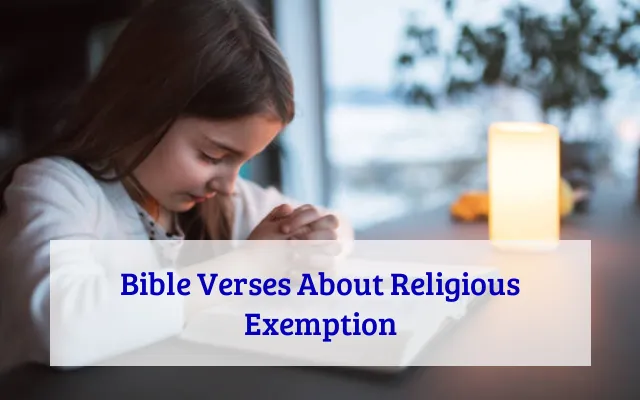Friends, if you’re seeking insight on ‘Religious Exemption Bible Verses,’ you’ve come to the right place. Today’s content is designed for those exploring biblical perspectives on religious freedom and exemptions. Here, we’ll delve into Bible verses that shed light on how faith intersects with societal obligations and personal convictions. These scriptures will help you better understand the biblical basis for religious exemptions and the balance between faith and civic duties. Let’s explore what the Word says about religious liberty and conscience.
Contents
- 1 What Does the Bible Say About Religious Freedom and Conscience?
- 2 Biblical Grounds for Religious Exemption Claims
- 2.1 Acts 5:29 – Obey God rather than human authority
- 2.2 Daniel 3:16 – Faithful refusal to worship false idols
- 2.3 Acts 4:19-20 – Obey God rather than human authorities
- 2.4 Exodus 1:17 – Midwives obey God over Pharaoh, sparing Hebrew boys
- 2.5 Matthew 22:21 – Render to Caesar; separate civic and spiritual duties
- 2.6 1 Peter 2:13-14 – Submit to authorities for God’s sake
- 3 Scripture Verses Supporting Personal Religious Convictions
- 3.1 Romans 14:22 – Keep your faith between yourself and God
- 3.2 1 Corinthians 8:9 – Use freedom responsibly, avoid stumbling others
- 3.3 James 4:17 – Knowing right, failing to act is sinful
- 3.4 Philippians 3:15 – Mature minds should maintain unity and seek clarity
- 3.5 Galatians 6:4 – Examine actions, take pride in personal responsibility
- 3.6 Hebrews 13:18 – Pray for us; clear conscience and honorable living
- 3.7 2 Corinthians 1:12 – Conduct guided by simplicity, godly sincerity, and grace
- 4 How to Use Bible Verses for Religious Exemption Applications
- 4.1 1 Peter 3:15 – Defend faith with gentleness and respect
- 4.2 Colossians 3:23 – Work wholeheartedly as serving the Lord, not men
- 4.3 Matthew 6:33 – Seek God’s kingdom first for all needs
- 4.4 Ephesians 6:7-8 – Serve wholeheartedly, reward comes from the Lord
- 4.5 2 Timothy 1:7 – Spirit of power, love, and self-discipline
- 5 Old Testament Passages About Following God Over Human Authority
- 5.1 Daniel 6:10 – Daniel prays despite king’s decree. Obeys God first
- 5.2 1 Kings 18:21 – Choose between serving God or following false gods
- 5.3 Joshua 24:15 – Choose whom to serve; follow God over human authority
- 5.4 Esther 4:16 – Obey God, risk life, defy human authority
- 5.5 Daniel 3:18 – Faithfulness to God over king’s decree
- 6 New Testament Teachings on Religious Liberty and Faith
- 6.1 Galatians 5:13 – Serve others humbly through love
- 6.2 2 Corinthians 3:17 – Freedom through the Spirit of the Lord
- 6.3 John 8:36 – True freedom through the Son
- 6.4 1 Corinthians 7:22 – Freed in Christ, servant of God
- 6.5 Romans 8:21 – Creation freed into glorious freedom of God’s children
- 6.6 James 1:25 – Blessed in doing, following the perfect law of liberty
- 6.7 1 Peter 2:16 – Live freely, yet responsibly under God’s authority
- 7 Biblical Examples of Religious Exemption in Action
- 8 Common Questions About Religious Exemptions and Biblical Support
What Does the Bible Say About Religious Freedom and Conscience?
When we talk about religious freedom and conscience, it’s about respecting each person’s journey with God. Each of us is called to live out our faith authentically. It’s comforting to know that the Bible acknowledges the importance of personal conviction and the freedom to follow our conscience. These scriptures remind us that God values our individual paths and choices.
Galatians 5:1 – Stand firm in freedom through Christ

Stand fast therefore in the liberty wherewith Christ hath made us free, be not entangled again with the yoke of bondage
Galatians 5:1
Explanation:- This verse highlights the freedom believers have through Christ, urging them to stand firm in that liberty and not return to spiritual bondage. It underscores the importance of religious freedom and following one’s conscience, as true freedom is found in Christ alone.
Romans 14:5 – Respect individual convictions on sacred days
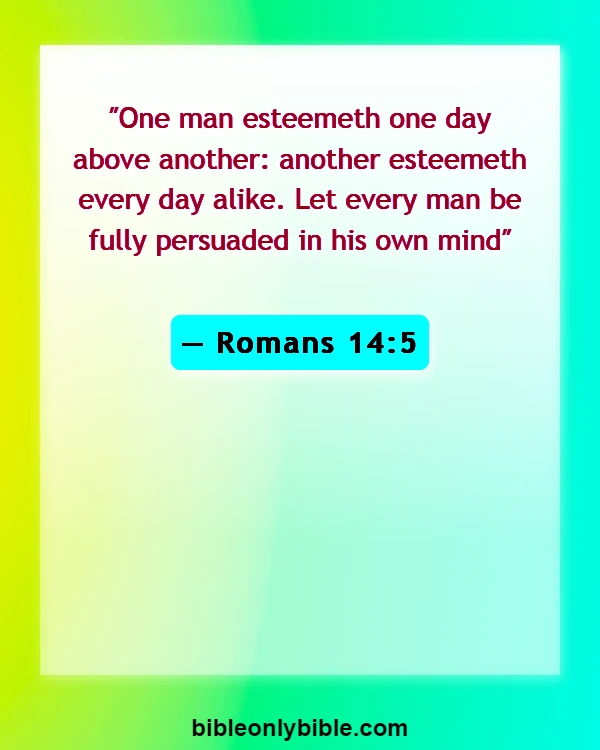
One man esteemeth one day above another: another esteemeth every day alike. Let every man be fully persuaded in his own mind
Romans 14:5
Explanation:- This verse highlights the importance of respecting individual beliefs and convictions regarding sacred days. It underscores the value of personal conscience and religious freedom, encouraging believers to honor diverse practices and interpretations within their faith communities.
Colossians 2:16 – Freedom from judgment on religious practices
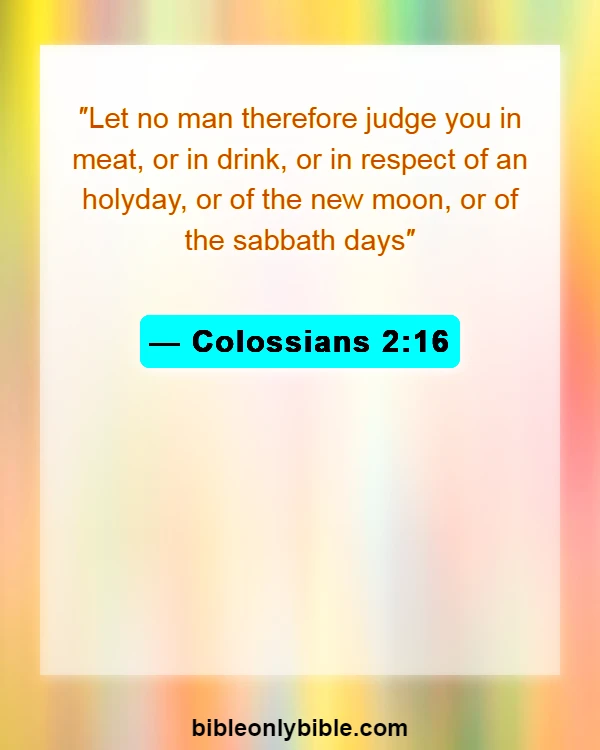
Let no man therefore judge you in meat, or in drink, or in respect of an holyday, or of the new moon, or of the sabbath days
Colossians 2:16
Explanation:- This verse highlights the importance of personal freedom in religious practices and warns against allowing others to judge one’s observance of religious rituals. It underscores the value of individual conscience and freedom in matters of faith, promoting a personal relationship with God.
1 Corinthians 10:29 – Respect others’ conscience; honor their beliefs
Conscience, I say, not thine own, but of the other: for why is my liberty judged of another man’s conscience?
1 Corinthians 10:29
Explanation:- This verse highlights the importance of respecting others’ beliefs and consciences. It encourages individuals to be mindful of how their actions may affect others’ spiritual convictions, promoting a sense of religious freedom and mutual respect within diverse communities.
Biblical Grounds for Religious Exemption Claims
When considering religious exemptions, it’s essential to root our understanding in Scripture. The Bible provides a foundation for why we might seek exemption based on our faith. It’s about aligning our actions with what we believe God is calling us to do, ensuring that our earthly obligations do not conflict with our spiritual convictions.
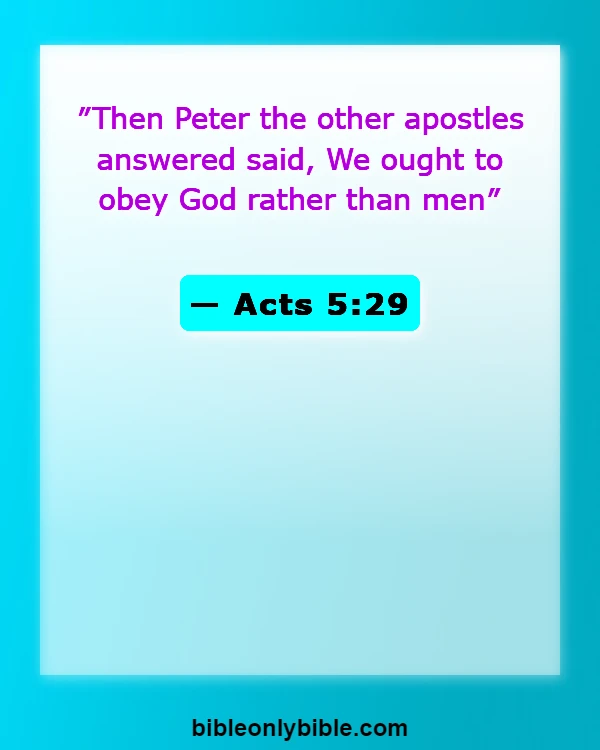
Then Peter the other apostles answered said, We ought to obey God rather than men
Acts 5:29
Explanation:- Acts 5:29 highlights the importance of prioritizing divine commands over human mandates. This verse supports the idea of religious exemption by asserting that when earthly authorities conflict with God’s will, believers are called to follow their faith and conscience.
Daniel 3:16 – Faithful refusal to worship false idols
Shadrach, Meshach, Abednego, answered said to the king, O Nebuchadnezzar, we are not careful to answer thee in this matter
Daniel 3:16
Explanation:- In this verse, Shadrach, Meshach, and Abednego demonstrate unwavering faith by refusing to bow to Nebuchadnezzar’s golden statue, illustrating a powerful biblical foundation for religious exemption. Their stance highlights the importance of staying true to one’s beliefs despite external pressures.
But Peter John answered said unto them, Whether it be right in the sight of God to hearken unto you more than unto God, judge yeFor we cannot but speak the things which we have seen heard
Acts 4:19-20
Explanation:- In this passage, Peter and John assert the priority of divine authority over human commands, highlighting the imperative to follow God’s directives when they conflict with societal rules. This principle forms a basis for religious exemption claims, emphasizing obedience to faith over secular demands.
Exodus 1:17 – Midwives obey God over Pharaoh, sparing Hebrew boys
But the midwives feared God, did not as the king of Egypt commanded them, but saved the men children alive
Exodus 1:17
Explanation:- In this verse, the Hebrew midwives choose to follow God’s moral law rather than comply with Pharaoh’s orders to kill Hebrew baby boys. Their actions illustrate the principle of obeying divine commands over human laws, providing a foundation for religious exemption claims.
Matthew 22:21 – Render to Caesar; separate civic and spiritual duties
They say unto him, Caesar’s. Then saith he unto them, Render therefore unto Caesar the things which are Caesar’s; unto God the things that are God’s
Matthew 22:21
Explanation:- This verse highlights the distinction between civic responsibilities and spiritual obligations. It suggests that while individuals should fulfill their duties to the government, they also have separate, sacred commitments to God, providing a basis for claims of religious exemption when civic duties conflict with spiritual beliefs.
Submit yourselves to every ordinance of man for the Lord’s sake: whether it be to the king, as supremeOr unto governors, as unto them that are sent by him for the punishment of evildoers, for the praise of them that do well
1 Peter 2:13-14
Explanation:- This passage encourages believers to submit to governing authorities as an expression of obedience to God. While it emphasizes respect for laws, it also opens discussions on when religious principles might justify exemptions, balancing civil obedience with faith convictions.
Scripture Verses Supporting Personal Religious Convictions
Our personal religious convictions are crucial to how we live our lives. They guide our decisions and actions, reflecting our relationship with God. The Bible encourages us to stand firm in our beliefs, even when faced with external pressures. These verses offer encouragement to stay true to the path God has set before us.
Romans 14:22 – Keep your faith between yourself and God
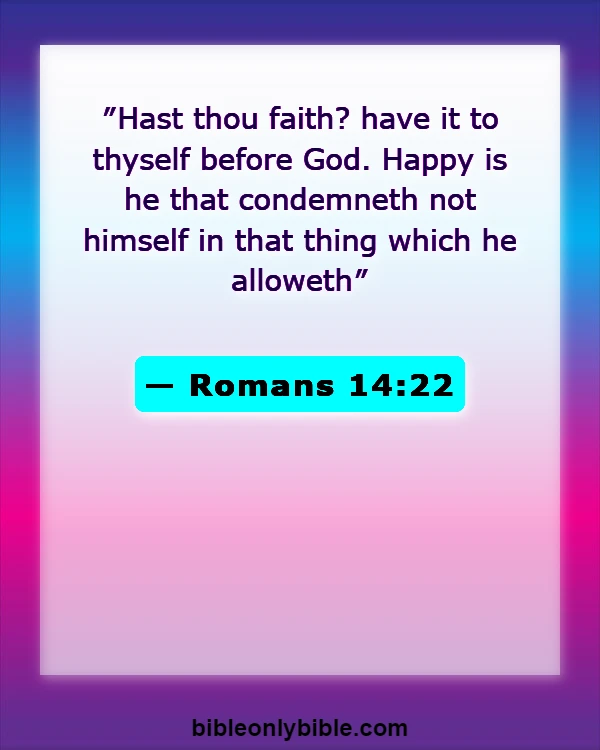
Hast thou faith? have it to thyself before God. Happy is he that condemneth not himself in that thing which he alloweth
Romans 14:22
Explanation:- This verse encourages individuals to hold personal religious convictions privately, fostering a relationship directly with God. It underscores respecting diverse beliefs without imposing one’s faith on others, promoting peace and understanding within a community of different religious perspectives.
1 Corinthians 8:9 – Use freedom responsibly, avoid stumbling others
But take heed lest by any means this liberty of yours become a stumblingblock to them that are weak
1 Corinthians 8:9
Explanation:- This verse encourages believers to exercise their freedom with care, ensuring their actions don’t lead others into sin. It highlights the importance of considering how personal choices affect the faith of those around us, promoting responsibility and empathy in our spiritual journey.
James 4:17 – Knowing right, failing to act is sinful

Therefore to him that knoweth to do good, doeth it not, to him it is sin
James 4:17
Explanation:- This verse highlights the responsibility of acting upon one’s moral and spiritual convictions. When aware of the right course of action, choosing inaction is considered sinful. This underscores the importance of aligning personal religious beliefs with ethical behavior, reinforcing the significance of living out one’s faith.
Philippians 3:15 – Mature minds should maintain unity and seek clarity
Let us therefore, as many as be perfect, be thus minded: if in any thing ye be otherwise minded, God shall reveal even this unto you
Philippians 3:15
Explanation:- This verse encourages believers to remain united in thought and purpose, trusting that God will reveal any needed clarity. It supports the idea that mature faith involves both conviction and openness to divine guidance, aligning with personal religious beliefs and exemptions.
Galatians 6:4 – Examine actions, take pride in personal responsibility
But let every man prove his own work, then shall he have rejoicing in himself alone, not in another
Galatians 6:4
Explanation:- This verse encourages individuals to evaluate their own actions and take personal responsibility. By doing so, one can take pride in their work without comparing themselves to others. This approach supports personal religious convictions by fostering self-awareness and accountability in one’s faith journey.
Hebrews 13:18 – Pray for us; clear conscience and honorable living

Pray for us: for we trust we have a good conscience, in all things willing to live honestly
Hebrews 13:18
Explanation:- This verse encourages believers to pray for one another and highlights the importance of maintaining a clear conscience and living honorably. It supports personal religious convictions by emphasizing integrity and the communal responsibility of upholding one’s faith.
2 Corinthians 1:12 – Conduct guided by simplicity, godly sincerity, and grace
For our rejoicing is this, the testimony of our conscience, that in simplicity godly sincerity, not with fleshly wisdom, but by the grace of God, we have had our conversation in the world, more abundantly to you-ward
2 Corinthians 1:12
Explanation:- This verse emphasizes living with integrity, guided by simplicity, sincerity, and God’s grace. It highlights the importance of a clear conscience and genuine faith in upholding personal religious convictions, providing a foundation for seeking religious exemptions based on authentic beliefs.
How to Use Bible Verses for Religious Exemption Applications
Using Bible verses in religious exemption applications can be a powerful way to express our deeply held beliefs. It’s about communicating how our faith informs our decisions and why certain actions might conflict with our spiritual understanding. These scriptures can help articulate the basis for seeking an exemption, rooted in our commitment to follow God’s guidance.
1 Peter 3:15 – Defend faith with gentleness and respect

But sanctify the Lord God in your hearts: be ready always to give an answer to every man that asketh you a reason of the hope that is in you with meekness fear
1 Peter 3:15
Explanation:- Defend your beliefs with a calm and respectful approach, ensuring your sincerity and integrity are evident. This principle is crucial when seeking religious exemptions, as it underscores the importance of articulating your faith-based reasons thoughtfully and courteously.
Colossians 3:23 – Work wholeheartedly as serving the Lord, not men
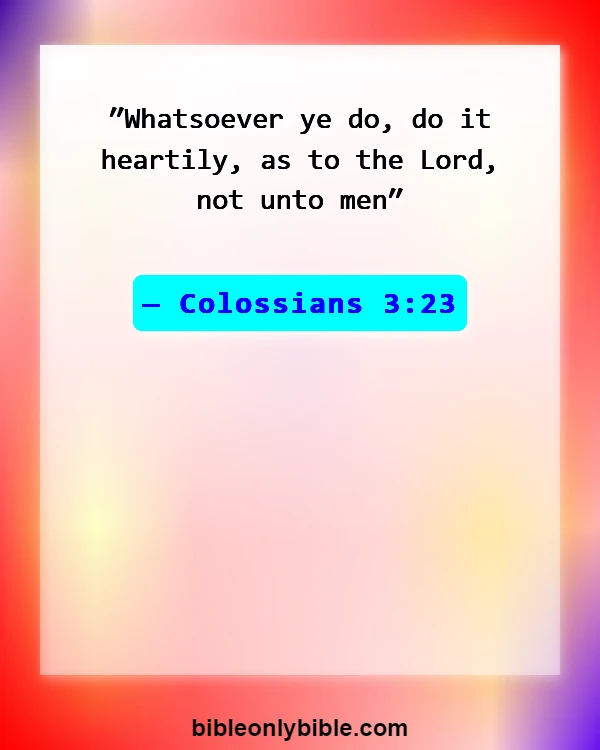
Whatsoever ye do, do it heartily, as to the Lord, not unto men
Colossians 3:23
Explanation:- This verse encourages individuals to perform their duties with sincerity and dedication, as if they are serving God rather than humans. In the context of religious exemption, it highlights the importance of aligning one’s actions with personal faith and spiritual convictions.
Matthew 6:33 – Seek God’s kingdom first for all needs

But seek ye first the kingdom of God, his righteousness; all these things shall be added unto you
Matthew 6:33
Explanation:- In seeking God’s kingdom and righteousness above all, believers can find assurance that their needs will be met. This principle can guide individuals in religious exemption applications, emphasizing faith and alignment with divine priorities over worldly concerns.
Ephesians 6:7-8 – Serve wholeheartedly, reward comes from the Lord
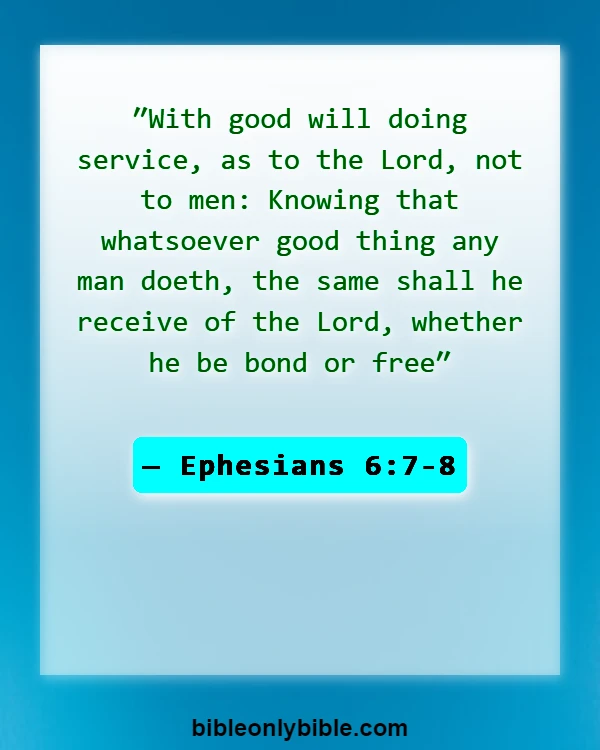
With good will doing service, as to the Lord, not to menKnowing that whatsoever good thing any man doeth, the same shall he receive of the Lord, whether he be bond or free
Ephesians 6:7-8
Explanation:- In Ephesians 6:7-8, the emphasis is on serving with sincerity and devotion, recognizing that true rewards come from God. When seeking religious exemptions, this mindset encourages individuals to act authentically, trusting that their faith-driven actions align with divine principles and receive God’s approval.
2 Timothy 1:7 – Spirit of power, love, and self-discipline

For God hath not given us the spirit of fear; but of power, of love, of a sound mind
2 Timothy 1:7
Explanation:- This verse highlights that believers are endowed with a spirit of power, love, and self-discipline, not fear. When seeking religious exemptions, this understanding can bolster confidence, reminding individuals that their faith empowers them to stand firm in their convictions with grace and wisdom.
Old Testament Passages About Following God Over Human Authority
The Old Testament is full of stories where God’s people chose divine guidance over human authority. These passages remind us of the importance of prioritizing our allegiance to God. They inspire us to follow His commands, even when it means standing against worldly pressures or decrees. It’s about trusting in God’s wisdom above all else.
Daniel 6:10 – Daniel prays despite king’s decree. Obeys God first
Now when Daniel knew that the writing was signed, he went into his house; his windows being open in his chamber toward Jerusalem, he kneeled upon his knees three times a day, prayed, gave thanks before his God, as he did aforetime
Daniel 6:10
Explanation:- This passage highlights Daniel’s unwavering faith and commitment to God, even when faced with a royal decree that forbids prayer. Daniel’s decision to prioritize his devotion to God over obeying human authority serves as a powerful example for those seeking religious exemption based on their faith.
1 Kings 18:21 – Choose between serving God or following false gods
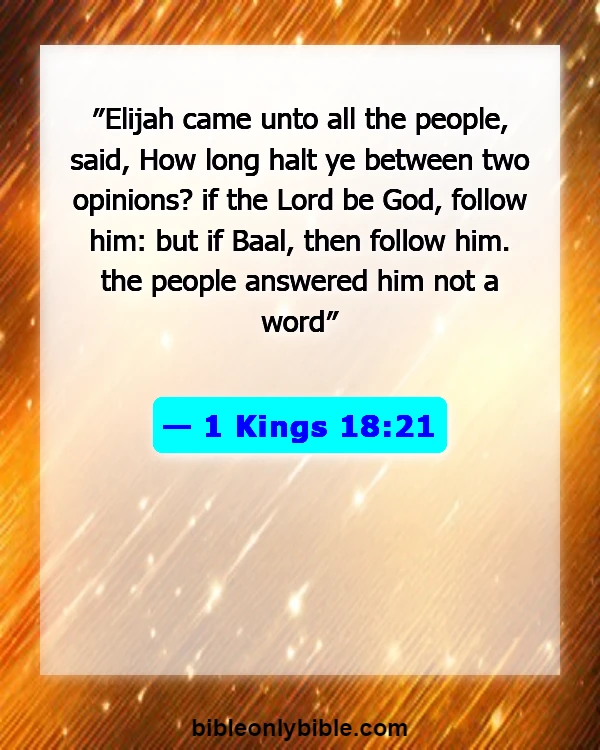
Elijah came unto all the people, said, How long halt ye between two opinions? if the Lord be God, follow him: but if Baal, then follow him. the people answered him not a word
1 Kings 18:21
Explanation:- This verse challenges believers to make a decisive choice between serving God and following false gods. It highlights the importance of unwavering faith and commitment to divine authority over human or societal pressures, encouraging believers to prioritize their spiritual convictions.
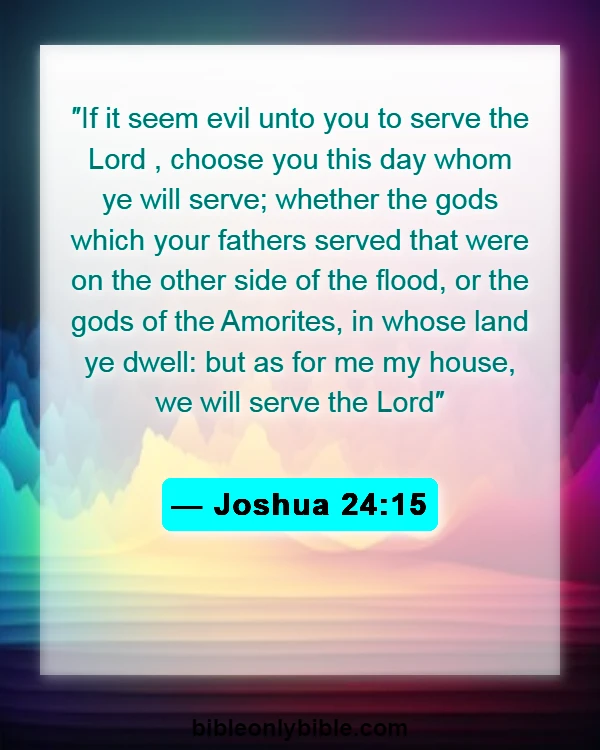
If it seem evil unto you to serve the Lord , choose you this day whom ye will serve; whether the gods which your fathers served that were on the other side of the flood, or the gods of the Amorites, in whose land ye dwell: but as for me my house, we will serve the Lord
Joshua 24:15
Explanation:- This verse urges individuals to make a deliberate choice about whom they will serve, highlighting the importance of prioritizing loyalty to God over human authority. It underscores the need for personal commitment to faith, encouraging believers to consciously choose devotion to God above all else.
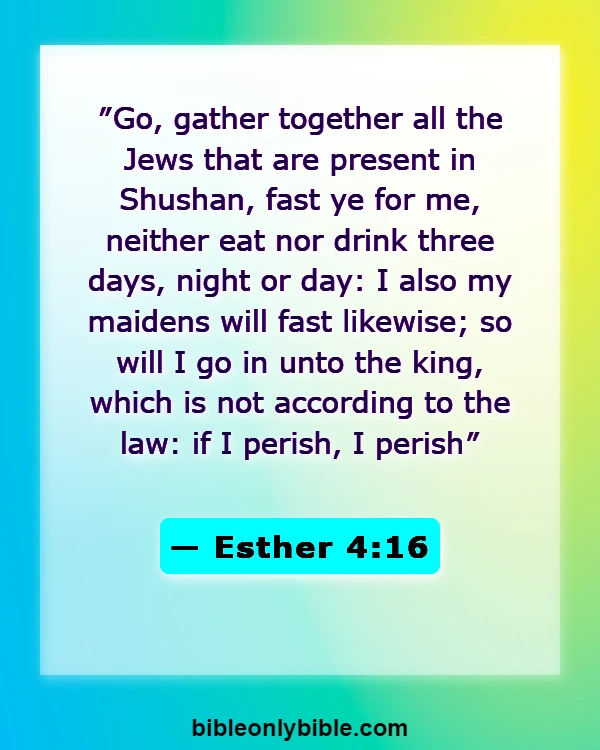
Go, gather together all the Jews that are present in Shushan, fast ye for me, neither eat nor drink three days, night or day: I also my maidens will fast likewise; so will I go in unto the king, which is not according to the law: if I perish, I perish
Esther 4:16
Explanation:- In this passage, Esther demonstrates courage by prioritizing her faith and duty to God over the fear of human authority. She risks her life to save her people, exemplifying the principle of obeying divine commands even when it involves defying earthly powers.
Daniel 3:18 – Faithfulness to God over king’s decree
But if not, be it known unto thee, O king, that we will not serve thy gods, nor worship the golden image which thou hast set up
Daniel 3:18
Explanation:- In Daniel 3:18, the verse highlights the unwavering faith of Shadrach, Meshach, and Abednego, who choose to obey God rather than the king’s command. Their steadfastness exemplifies the importance of remaining true to one’s beliefs, even when facing severe consequences.
New Testament Teachings on Religious Liberty and Faith
The New Testament emphasizes the freedom we have in Christ and how our faith liberates us to live fully in His truth. It teaches us that our spiritual freedom is not about indulging ourselves but serving others in love. These teachings encourage us to embrace our liberty in faith, using it to glorify God and support one another.
Galatians 5:13 – Serve others humbly through love
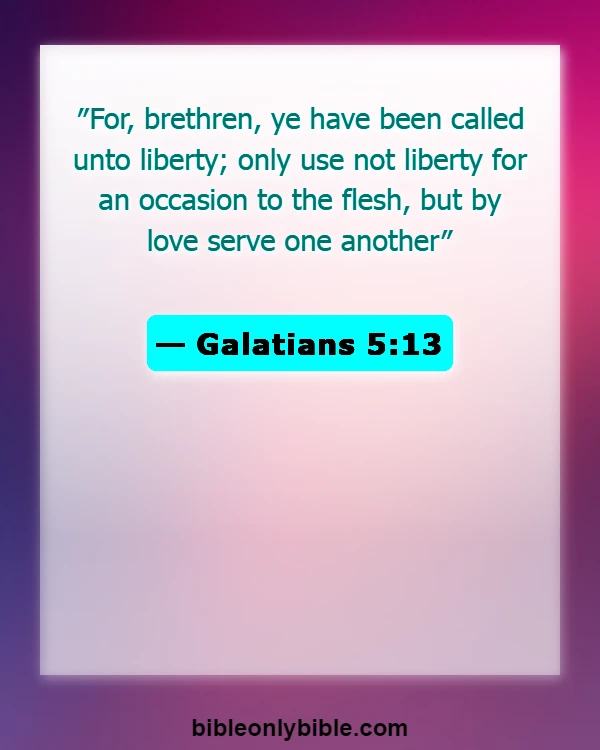
For, brethren, ye have been called unto liberty; only use not liberty for an occasion to the flesh, but by love serve one another
Galatians 5:13
Explanation:- This verse emphasizes the freedom believers have in Christ, urging them not to use this liberty for selfish desires. Instead, they are called to serve one another with humility and love, reflecting the core teachings of the New Testament on faith and religious liberty.
2 Corinthians 3:17 – Freedom through the Spirit of the Lord

Now the Lord is that Spirit: where the Spirit of the Lord is, there is liberty
2 Corinthians 3:17
Explanation:- This verse highlights that true freedom comes from the Spirit of the Lord, emphasizing spiritual liberation rather than legalistic constraints. It suggests that embracing the Spirit leads to a deeper understanding and practice of faith, encouraging believers to live with liberty in their convictions.
John 8:36 – True freedom through the Son
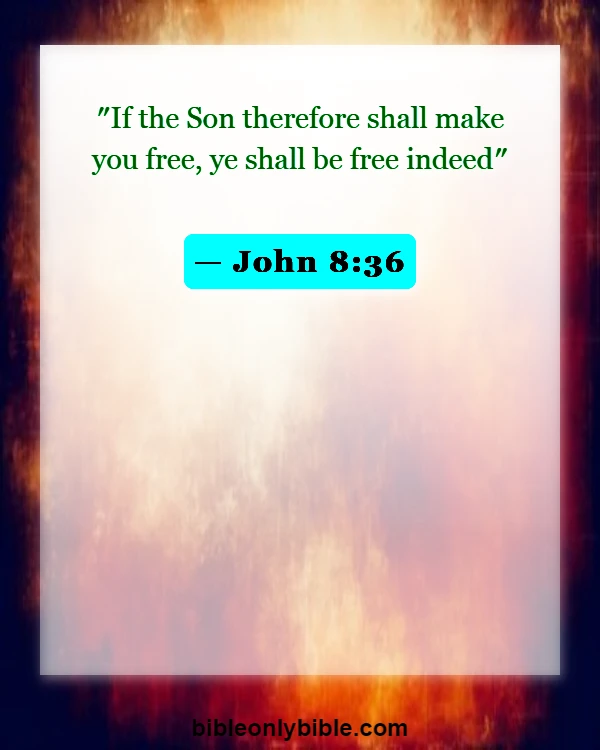
If the Son therefore shall make you free, ye shall be free indeed
John 8:36
Explanation:- True freedom comes through a relationship with Christ, offering liberation from sin and spiritual bondage. This verse underscores religious liberty by highlighting that genuine freedom is found in the transformative power of faith, transcending earthly constraints and granting believers inner peace and autonomy.
1 Corinthians 7:22 – Freed in Christ, servant of God
For he that is called in the Lord, being a servant, is the Lord’s freeman: likewise also he that is called, being free, is Christ’s servant
1 Corinthians 7:22
Explanation:- This verse highlights the paradox of spiritual freedom and servitude in Christ. Believers, regardless of their earthly status, find true freedom in their faith, while also willingly serving God. It emphasizes the transformative power of faith, granting liberty while fostering devotion.
Romans 8:21 – Creation freed into glorious freedom of God’s children
Because the creature itself also shall be delivered from the bondage of corruption into the glorious liberty of the children of God
Romans 8:21
Explanation:- This verse highlights the hope that all creation will be liberated and share in the freedom and glory of God’s children. It underscores the New Testament theme of spiritual freedom, suggesting that true liberty is found in living according to God’s will, beyond earthly constraints.
James 1:25 – Blessed in doing, following the perfect law of liberty
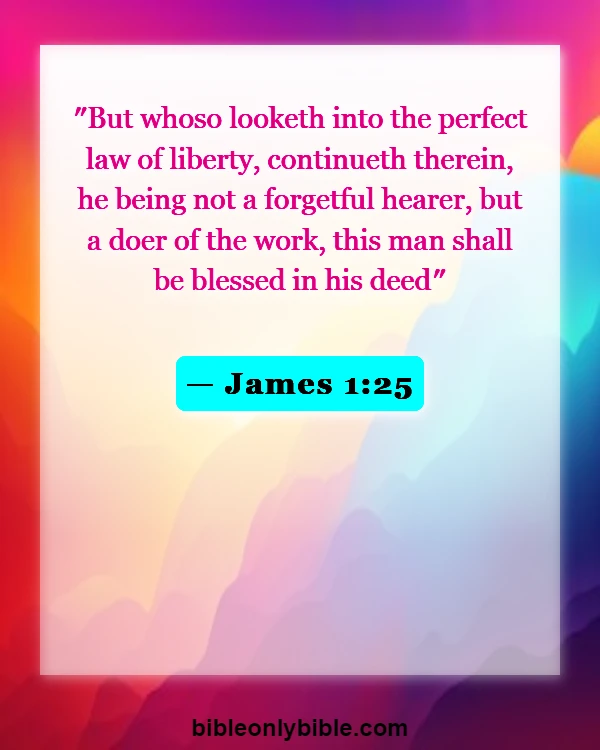
But whoso looketh into the perfect law of liberty, continueth therein, he being not a forgetful hearer, but a doer of the work, this man shall be blessed in his deed
James 1:25
Explanation:- This verse highlights the importance of embracing and acting upon the teachings of faith, described as the “perfect law of liberty.” It suggests that true freedom and blessings come from not just hearing but actively living by these principles, reinforcing individual religious conviction and liberty.

As free, not using your liberty for a cloke of maliciousness, but as the servants of God
1 Peter 2:16
Explanation:- This verse encourages believers to embrace their freedom in Christ while living responsibly and honoring God’s authority. It highlights the balance between enjoying spiritual liberty and maintaining integrity, underscoring that true freedom involves serving others and upholding divine principles.
Biblical Examples of Religious Exemption in Action
The Bible provides numerous examples of individuals who stood firm in their faith, even when it meant seeking exemptions from societal norms. These stories inspire us to be courageous and faithful, demonstrating that God honors those who choose to follow Him despite external pressures. They are powerful reminders of the strength found in unwavering faith.
Daniel 3:16-18 – Refusal to worship idols; trust in God’s deliverance
Shadrach, Meshach, Abednego, answered said to the king, O Nebuchadnezzar, we are not careful to answer thee in this matterIf it be so, our God whom we serve is able to deliver us from the burning fiery furnace, he will deliver us out of thine hand, O kingBut if not, be it known unto thee, O king, that we will not serve thy gods, nor worship the golden image which thou hast set up
Daniel 3:16-18
Explanation:- In this passage, Shadrach, Meshach, and Abednego demonstrate unwavering faith by refusing to worship the king’s idol, prioritizing their commitment to God. Their courageous stance highlights religious exemption, trusting in divine deliverance even when facing severe consequences for their beliefs.
Daniel 6:13 – Daniel defies king’s edict, prioritizes prayer to God
Then answered they said before the king, That Daniel, which is of the children of the captivity of Judah, regardeth not thee, O king, nor the decree that thou hast signed, but maketh his petition three times a day
Daniel 6:13
Explanation:- In Daniel 6:13, Daniel’s unwavering commitment to his faith and prayer to God, despite the king’s decree, exemplifies religious exemption. His defiance highlights the importance of prioritizing spiritual convictions over earthly laws when they conflict with divine directives.
But Peter John answered said unto them, Whether it be right in the sight of God to hearken unto you more than unto God, judge ye
Acts 4:19
Explanation:- In this verse, Peter and John assert the primacy of obeying divine authority over human commands. When faced with a conflict between God’s will and human rules, they choose to follow their faith, exemplifying religious exemption through unwavering commitment to their beliefs.
Common Questions About Religious Exemptions and Biblical Support
Many people have questions about religious exemptions and how they align with biblical teachings. It’s important to explore these questions with an open heart, seeking guidance from Scripture. The Bible provides clarity and support, helping us understand how our faith can inform our decisions regarding exemptions. Let’s delve into these common inquiries with a spirit of learning.
1 Corinthians 10:31 – Do everything for the glory of God
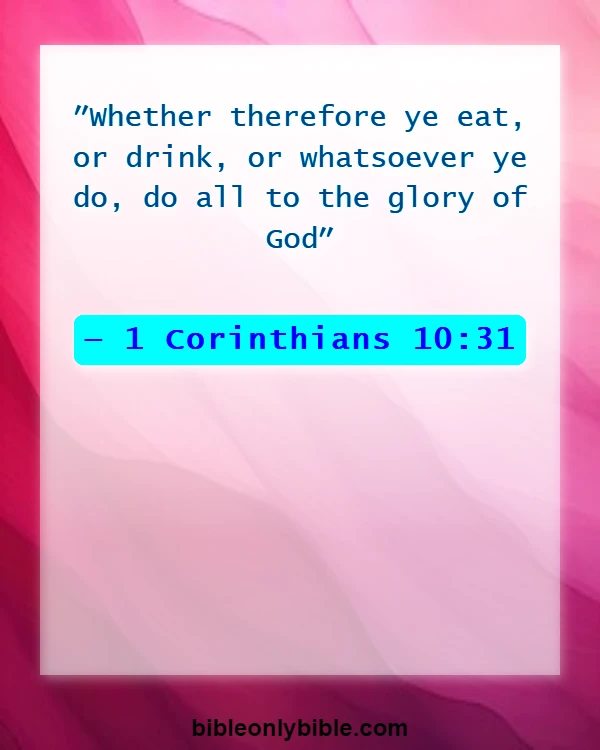
Whether therefore ye eat, or drink, or whatsoever ye do, do all to the glory of God
1 Corinthians 10:31
Explanation:- This verse encourages believers to ensure that all actions, even mundane ones, honor God. In the context of religious exemptions, it may guide individuals to evaluate their choices and decisions through the lens of glorifying God, aligning personal beliefs with actions.
